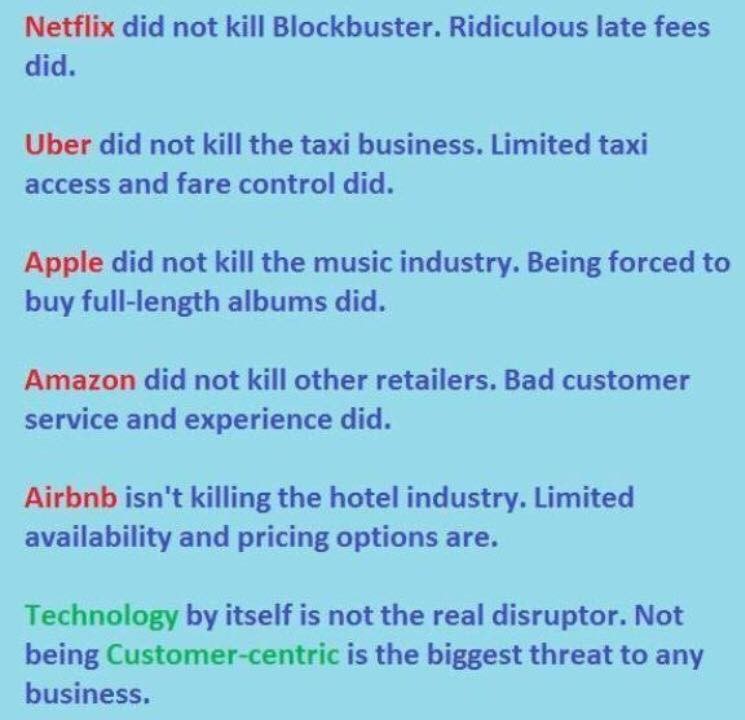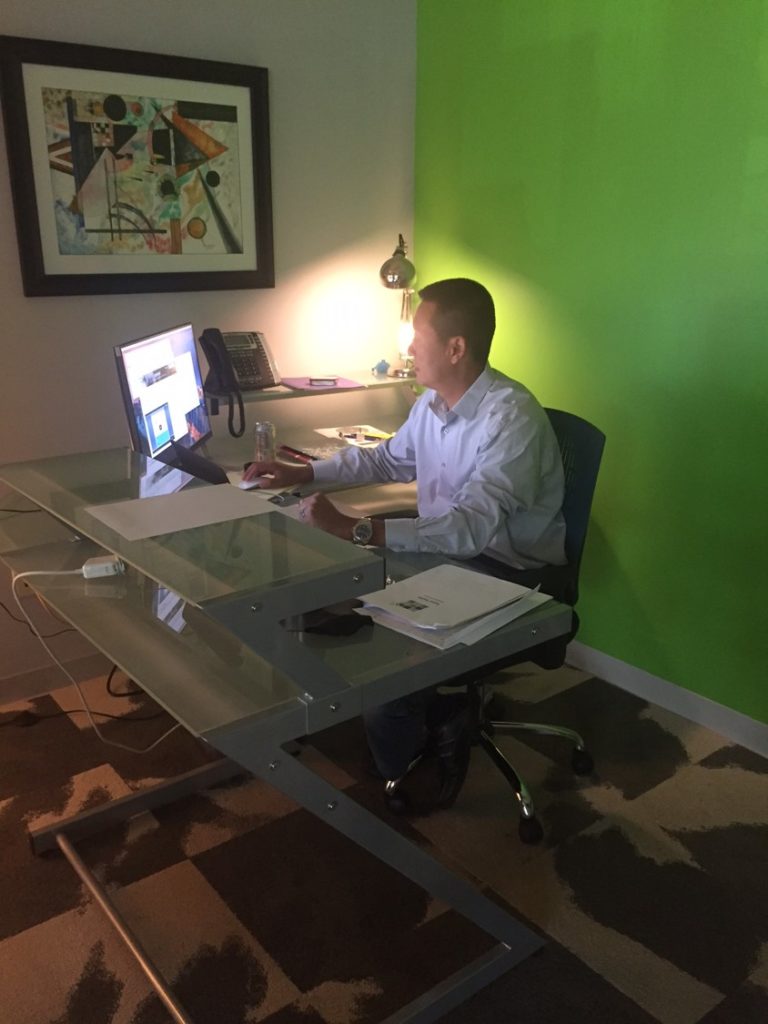 I’m not usually a fan of memes.
I’m not usually a fan of memes.
Most often, they’re a lazy way for social media brands to lazily attract a lot of “likes.” When Lori Lewis was with our company, we used to regularly see stations overdo memes, usually at the expense of posting social content that engaged or delighted. In fact, with some stations, it was “Meme City.” They became socially addicted to posting memes – dogs playing poker, cats doing crazy tricks, and people performing stunts reminiscent of “America’s Funniest Home Videos.”
But the other day, I kept running across the meme at the top of this post – a vivid reminder of how disruption has impacted many businesses and industries. But as the meme reminds us, there are the self-inflicted wounds that companies, brands, and other verticals have perpetrated on themselves that hasten their erosion, and in many cases, their demise.
And the conclusion – the failure to focus on the customer is the biggest mistake a brand or industry could make – is the basis of this “cautionary meme.”
To put it in radio terms, the industry is being surrounded by predators and competitors alike – all trying to offer a cleaner, better, and more personalized experience. In many ways, radio has valiantly fought off this digital onslaught, hanging on to much of its reach and reputation. And while future battles may revolve around familiar issues like content and distribution, a customer focus has become table stakes – whether you’re running a hotel, an airline, a big box store, or a radio station.
 Yesterday’s post about how the tired meet & greet model could be transformed into a true fan experience resonated with many people – both in comments you can read and through several emails and phone conversations I had. This idea of radio raising its game by focusing on the LX – or Listener Experience – goes to the heart of the meme’s message and what we were discussing in the post.
Yesterday’s post about how the tired meet & greet model could be transformed into a true fan experience resonated with many people – both in comments you can read and through several emails and phone conversations I had. This idea of radio raising its game by focusing on the LX – or Listener Experience – goes to the heart of the meme’s message and what we were discussing in the post.
It’s not enough to feature an entertaining morning show, a provocative talk host, or a clever podcast. It is about how a radio station caters to and serves its audience. And that means a company emphasis on the LX: being responsive and caring about fans, customers, and the localities radio serves. We see and hear about this service deficit with some regularity in focus groups, L.A.B.s and 1-on-1 interviews where phones go unanswered, complaints are unheeded, and consumer concerns are ignored. We see these issues, by the way, in both commercial and public radio settings.
At our mobile apps development company, jācapps, we have recently invested in our user experience – how our apps work, feel, and react. Are they responsive, fun to use, and easy for consumers to utilize? To ensure our apps and related products like Alexa “skills” are optimal for  consumers we’ve invested in our UX by hiring an expert in the field, Nathan Turner (pictured right).
consumers we’ve invested in our UX by hiring an expert in the field, Nathan Turner (pictured right).
Tech companies intuitively know they have to be responsive to the user experience. It goes with the territory.
So, imagine a radio company hiring an LX expert – someone whose main mission is to work with station staff and management to ensure the optimal experience.
If radio is to successfully address its competitive challenges, it will need to step up its game. Because at its core, radio is a service business – whether we’re talking about audiences, advertisers, or communities. There’s a reason why tech companies are spending millions and billions on customer focus and the user experience.
In an age of online reviews, social media, and a power shift that is now tilting toward the consumer, there is no better time for the biggest radio companies as well as the ma-and-pa’s to rethink their LX.
Sometimes, there’s a reason why memes go viral. The really good ones are spot-on.
- Old Man, Take A Look At My Ratings - December 20, 2024
- In The World Of On-Demand Audio, How Do We Define Success? - December 19, 2024
- Scenes From The Classic Rock Highway – 2024 Edition - December 18, 2024




Excellent as always!
Thanks!
Thank YOU, Mark.
Fred:
Usually, I agree with what you [Fred Jacobs] write in your daily blog 100%. If the topic is not already a thought I hold, it’s always a great starting point. You’ve easily been my most important mentor and learning to think like you is something I’ve been trying to master since the ‘80s.
Therefore, it’s a great surprise to me when I find myself disagreeing with you two days in a row. Both days your focus is on “The Listener Experience, ” (LX) and we share the same thoughts in that regard. Maybe it’s just your examples that I took issue with and the nature of why radio gets it wrong so often. Radio is show business (although as a favorite personality of mine has frequently said: “The lowest rung of show business. Well, they’re circus clowns, but after that, we’re the lowest rung on the show biz ladder.”
Each of the companies you mention today is a famous “disruptor.” You identify the weaknesses of the industries Netflix, Uber, Apple, Amazon, and Airbnb disrupted but none of them would have been possible with the technology available 15 years ago. Further, none of their competitors and certainly none of the major radio companies that I worked for would have agreed to lose money on such ventures for a decade or more – which most or all of your examples have done (except Apple).
Fred, on(at least) one occasion you were there when it happened to me. Long before NFL teams were on Heritage Rock stations across the company, I pitched the CEO on the idea of snatching away the rights to the cities beloved NFL franchise from under a sleepy little AM station. The GM couldn’t paint a happy face on the finances, and so I pitched it as a loss leader to the CEO. I predicted we’d be number one total week and in virtually every key demo. This CEO was clearly no fan of “loss leaders.” I left an imprint that could only be compared to Wil E. Coyote as I went backward, virtually through the wall.
The next time the contract came up, the station did get the contract. It was a great LX for football fans and stations P1 listeners. In fact, the station did reach number-one P12+ and A25-54 for the first time.
Does anybody believe radio corporations would have supported ideas such that redefined industries, such as Amazon, Uber, or Netflix? How many real disruptors has the radio industry seen since at least the 90s? Everything good thing happening with audio either digitally or with podcasts could have and should have been done by radio years ago. It was ours to own and provide great LX, but that would have cost money. We didn’t, and well, here we are today.
As for the meet and greets. One of the readers commenting about “Meet and Greets” pointed out the two flavors; the radio gatherings and the fan experiences. Fred, you’ve done this longer than I have. We’ve both seen a lot of “wacky” stuff where DJs did their best to earn the comparison to circus clowns (and performers worked hard to prove they were jerks) – but in all my years I’ve never heard a story that compares to the Taylor Swift – David Mueller incident.
The events designed for radio people can help create excellent content. While often perfunctory, on occasion air talents learn something about the people they talk about on the air (I’ve seen this with musicians, athletes, and politicians). Now and then a genuine friendship or at least ongoing communication that gives the personality added insight to a specific person important to listeners.
For listeners actually meeting a star, and hopefully, one they greatly admire is often a once in a life time opportunity. We’re jaded and understand that at best this is something required of performers. Sometimes we can tell how badly they want to get it over with, as well. But when a fan meets a truly charismatic star who knows how to do it right, they make you feel like you’re the only person in the world – even if it’s for 15-20 seconds. We all have a story about somebody we made a personal connection with, even if we never saw them again.
If you ever get the chance to meet Danny Bonaduce (KZOK, Seattle) work a room, please do. People who think they hate him walk away lifelong friends. I could name countless others.
Giving away event tickets, vacations, and even cash is terrific. For many people, exotic vacations are off the table in today’s economy. Winning $10,000 will impact most people’s lives, but a year from now people won’t be talking about either. The picture of the contest winner with their favorite musician, actor, politician, author or other celebrity is one they will never forget and a story they will never stop recounting to their friends.
Andy, you raise several valid points (and I’m glad I got the juices flowing). You’re correct that radio has had ample opportunities to own its future by investing in it – partnering with existing companies, buying them outright, or creating their own businesses. That said, I do believe we’re witnessing something of a turnaround, and you don’t have to look farther than podcasting to see it. The investment that WNYC, PRX, NPR, and other public radio brands have made is daring – and smart. Similarly, Hubbard, Scripps, and now Entercom are moving aggressively in the podcasting space, too.
As for meet & greets, we’re on the same page. Radio has the ability to make indelible memories (and now fans can share them on social media) – and it’s not going to come from winning money or even a vacation. You’re right that the personal touch – a celebrity, a DJ, etc. – is really what that LX is all about.
Thanks for taking the time to get it down on paper and post it here. I love when these posts morph into conversations.
As someone who is of the millenial generation (which I just brush off any of those negative traits we tend to get stuck with) I am all about the interaction aspect of radio. It’s just as important to be interactive with your audience on social media AND text lines as it is on the phones. The airwaves are not the only way we are delivering content anymore and I firmly believe ratings are impacted by how social a station is on all platforms.
I don’t like doing “caller *insert number*” for prizes. I like to play games on social media with the audience or make videos and see if they can make their own. I want to see their creativity and let them know that we want to hear from them as much as we want them to hear us.
I know I try to respond to every comment, tweet or text I get while on air and I can tell it makes an impact. It allows for that personal connection.
As for the podcast side of things, it is not something I was personally into because I suffer from the attention span the technology of today has created. However, two other guys and I have created one that tends to be no longer than 20 minutes because just like everything else, they will probably start to trend shorter. But now that I am a part of one, I pay attention to the other’s that are out there. This is a great outlet for me as it allows me to expound more on topics and doesn’t limit me to the usual 8 to 30 seconds breaks during my shift.
One last thing, I think radio is both a service and show business. More so in the 21st century.
I think the concept of serving audience has nothing to do with generations and has everything to do with your mindset. Chuck, you’re in the right zone – expanding the pie, taking advantage of the tool kit. Stay tuned and keep podcasting.
Fred,
You always stimulate brain activity! Continuing this dialogue will veer from Listerner Experiences, where we apparently agree and morph into a state of the industry – and how we got here conversation.
No doubt, NPR and several of its Member stations got it early and nailed it. Under the leadership of Jarl Mohn they’ve become a terrific organization. Eric Nuzum, Alex Blumberg and many others made names for themselves starting at NPR. Following Audible and Gimlet has been interesting as well. I’ve seen Anya Grundmann make several presentations and was wowed by her and the research NPR does. There’s a good reason so many of their (or Member stations) top the podcast list every month.
You’re working closely with most of the big broadcast groups, so I believe you when you say they are “making aggressive moves into the podcast space, too.” But it’s nearly 2018 and NOW the industry that has provided audio content for 90 years is getting serious about podcasting. I can’t tell long you’ve been tracking podcasting from Techsurvey 13. Edison’s Infinite Dial study appears to track podcasting to at least 2006 and online listening to 2000.
The pattern is eerily similar to what newspapers did in the 1990s. The results are pointing toward a comparable result. Who knows, Jeff Bezos could buy some of the great call-letters at ‘fire-sale’ prices in a few years and Hubbard, Scripps or Entercom could reinvent their online product and update their business model, as the New York Times did, too.
It’s just a shame to have the fight to reclaim “audio content” that radio owned for 90 years.
All bets are off and anything’s possible. I’m writing this from Podcast Movement in Anaheim, and there are at least twice the number of radio people here than last year. I think that’s a sign of where we’re headed. Will broadcasters be bold enough to disrupt themselves in the podcasting space – or create channels they can integrate and monetize. Stay tuned. (How’s that for a tease?)
The even bigger point is that Podcasting is growing in importance and something radio should (should have a while ago)try to own, but that its the tip of the iceberg.
Andy is right, radio has been loath to invest in its future and is paying the price now. It ceded streaming to Pandora and now also to Spotify and Apple. Current royalties don’t allow it to be anything but a money pit, but its not as if if Radio has read the tea leaves and placed enough importance on it to try to negotiate something better.
Its never been that hard to see trends in consumer tastes in audio. Your tech surveys alone have provided more than enough insight. Radio has done an amazing job of keeping its fans despite all that has evolved around it. At some point, if it doesn’t do something (a bunch of somethings really) radio will become a second tier player. Probably not to any one competitor, but to all of them put together.
Its interesting that Andy Bloom was central to this conversation. He was central when they decided to run Howard in Philly at YSP. I remember him telling me that that they felt they were desperate and had nothing to lose. I don’t think that the radio industry will be able to revive itself as quickly or thoroughly if it waits until it’s as desperate as YSP was in the mid 80s.
I can certainly speak to YSP’s desperation back then as I was on that team as well. When they say that necessity is the mother of invention, they’re not kidding. And you’re right, Bob, that you don’t want to get to that point in the digital media zone. Podcasting is a primary opportunity for commercial radio (public radio is making good on the potential). But as we learned at Podcast Movement this week from WNYC’s Dean Cappello, there is no shortcut to success. It requires an investment – not only of financial resources, but time and brain power. The opportunity is there, but broadcasters will have to do more than buy their way into the space. Thanks for a good comment.